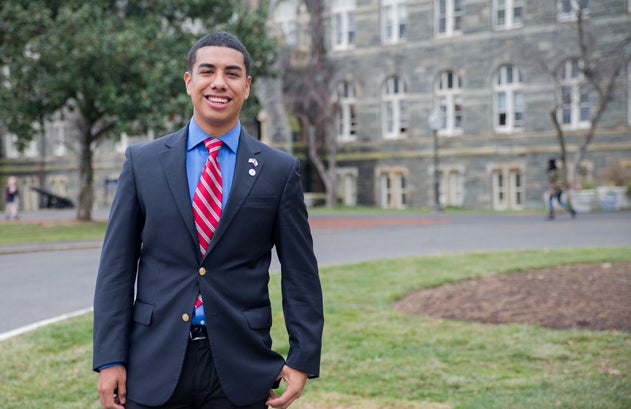Spring 2013 Student News
Student Founded Si Se Puede Network

Adan Gonzalez (C’15) founded the Si Se Puede Network to help disadvantaged students keep up their grades, perform community service, and develop leadership skills. Photo by Tess O’Connor.
February 19, 2013– For most of his life, Adan Gonzalez struggled through poverty in a small Texas neighborhood that rarely produced college graduates. Now, he uses his self-made organization, the Si Se Puede Network, to mentor students and break cycles of under-education across the country.
Gonzalez grew up in Oak Cliff, a predominately Mexican-American community in Dallas that is mostly known for crime and socioeconomic strife. As a child, he sensed a disconnect between his surroundings and the American dream his parents had believed in when they immigrated to the United States in the 1980s.
The seven members of his household shared one room, while his father worked long days as a custodian and “hustled” for milk and bread. There was no Internet access in his apartment complex, and sometimes no electricity. Gonzalez sold snacks in a local flea market to pay for school uniforms and fought bullies so well that his family thought he might become a professional boxer.
In high school, Gonzalez realized that through academic success he could make life better for himself and his relatives.
“That’s when I started doing well in school. I saw how proud my dad would be when the teachers told him I was smart or that my grades were really good,” Gonzalez said. “I wanted to show my parents that their sacrifice and hard work was worth it.”
Gonzalez was elected senior class president, logged thousands of hours of community service, and graduated salutatorian, all while amassing one million dollars’ worth of scholarships. Georgetown became his “dream” school in part because he wants to pursue a career in politics as either mayor of Dallas or governor of Texas to aid the underprivileged communities in those areas.
“I didn’t know about colleges. No one in my family had been to college,” Gonzalez said. “But as soon as I walked through the [Georgetown] gates and saw Healy, it was a magical feeling.”
Gonzalez has parlayed his tough childhood into academic interests, double majoring in government and sociology and minoring in education, inquiry, and justice.
“A lot of the classes that I’m taking really highlight why, as children, we feel inferior right away. Sometimes, [that feeling of inferiority] causes fear. Those who are not willing to face that fear become a statistic,” Gonzalez said. “That’s why I feel education is important.
“With the government major, I think you cannot argue a case or fight for an issue if you don’t understand it from all sides,” he continued. “I see it as my duty to gain as much knowledge as possible and to go back to my community and help everybody—to teach others how to teach themselves, so it can have a domino effect. That’s something I learned in sociology class.”
Gonzalez founded the Si Se Puede Network last summer to give his simple philosophy for success to ambitious but disadvantaged students: Great students keep up their grades, perform community service, and develop leadership skills.
Si Se Puede, which roughly translates to “Yes, We Can” in Spanish, started as a radio show. Gonzalez and his guests, including class presidents from across Dallas, discussed “everything from teen pregnancy to drug use in schools to bullying.” Now, Gonzalez uses his group to help students find community service opportunities and scholarships.
“Sometimes, the students are 14 or 15 years old, and that’s what excites me right now. I get at least two messages a day from different kids from different places telling me not just that they’re inspired by me, but that they have learned to do more,” Gonzalez said. “I learned this as a senior in high school, and they’re freshmen and they already want to do this. That’s the beauty of it.”
Gonzalez is now in talks with student leaders from Arizona, California, and New York about founding branches of Si Se Puede in those states, and he is currently seeking to make the project an official nonprofit organization.
While it is difficult to balance his work and studies at Georgetown—he has three jobs, which allows him to send money back to his family—Gonzalez is grateful for the doors that Georgetown has opened.
“I’ve learned that with the opportunities I receive, I’m able to create more opportunities for others. That was the whole point of the Si Se Puede Network,” he said. “I’m no longer this poor Mexican kid with dreams. I’m a Georgetown student with goals.”
—Brittany Coombs
Archive
Yalda Baktash, class of ’18 (Spring 2016)
Eeuphelma Wangchuck, class of ’16 (Spring 2016)
Caitlin Snell, class of ’16 (Spring 2016)
Danyel Semple, class of ’15 (Spring 2015)
Kendall Ciesemier, class of ’15 (Spring 2014)
Josh Powell, class of ’14 (Spring 2014)
Josh Powell, class of ’14 (Fall 2013)
Adan Gonzalez, class of ’15 (Spring 2013)
Karina Ramírez, class of ’10 (Fall 2010)
Rebecca Shinners, class of ’09 (Fall 2010)
José Zachary Canto, class of ’08 (Fall 2007)
Elisa Cervantes, class of ’06 (Spring 2006)
Rebecca Medway, class of ’06 (Spring 2006)
Alexandra Rollins, class of ’03 (Spring 2002)
Carrie-Ann Ferraro, class of ’03 (Spring 2002)